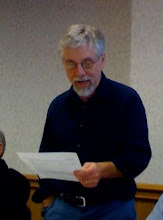5/1/10
Saturday morning and up early. I tour the yard, return inside and make coffee. Syl has been gone to Mexico for 2 weeks, and I notice that the house is still nice and clean. I think to myself, “If you don’t make a mess or track dirt in, the house will stay clean, except for a little dust, which doesn’t worry me.” I smile, workload reduced.
Saturday morning and up early. I tour the yard, return inside and make coffee. Syl has been gone to Mexico for 2 weeks, and I notice that the house is still nice and clean. I think to myself, “If you don’t make a mess or track dirt in, the house will stay clean, except for a little dust, which doesn’t worry me.” I smile, workload reduced.
Hmm, where did those dead leaves come from?? I look up and see a wilted tree... ooooh. And like a suspense/horror movie (or a good Simpson’s parody), where the hero’s vision quickly and abruptly shifts around the room- bam, bam, bam-- noticing the unnoticed, the key clues and evidence--- I suddenly notice 5 other plants, crowded around the edges of our sunroom, seeking sun, but, dying of thirst!! Whoops... I realize that there are 2 more rooms with other plants... oouuuhh...
Syl is away in Ixtapan, a dry climate, and in 2 weeks, I simply never noticed “her” unassuming and quiet plants. I rush for a pitcher and the sink. The plants get a good old fashioned soakin’, when it rains it pours. I hope they make it, I like plants, really, I just didn’t notice. And, in a way, the plants have just had a little taste of travelling. They now know what their brethren in the Kalahari Desert experience!
Through repetition, we learn to see the world in patterned ways. We “Know” and act. There’s a confidence and efficiency that results. Our brains can rest, or our attention can turn elsewhere, except.... when things change, results fall off, or we are less than satisfied. I participated in a workshop for non-profit organizational leaders on strategy that we held at Le Moyne. We spent the time not with SWOT analysis tools, but rather rather exploring what it means to think strategically. This involves seeing what we don’t see; knowing what we don’t know; getting outside the box.
Easier said than done of course. There are many forces at play that keep us on our present course, so what helps us see anew? Examining and reflecting are good starts. To see what’s “not there”, we can examine our passions and purposes. What am I really about? What gets me energized? When do I feel most alive? We can decipher the underlying assumptions, values, beliefs, and expectations we hold, and that hold the world (and our experience) steady. Why? And Why? again. Does everyone believe this? How do others that I trust and respect behave? Why? Inquiry can help to loosen the binds that hold us in place, the blinders that (overly) focus us. We can engage and connect with others on these questions, both inside and beyond our organizations. The staggering power of teams manifests when several of different view and skills appreciate and give room to create something togehter that no one could do alone. As we clarify the key “value proposition”, we can begin to see (and know) afresh all current and considered actions in relation to the core strategic focus.
What new worlds exist, right here and now, that you fail to see?




Noticing the unnoticed often happens to me (for a small scale example) when I'm cleaning. I start cleaning one thing and end up cleaning all day. Moving from one thing to the next noticing new, unending things that I've lived with, but never seen. Which often leaves me slightly shocked.
ReplyDeleteI think, in my case, the reason that these things go unnoticed is because I don't want to notice them. It much easier to not see the dust and clutter; the dead fly on the window sill or floor, for example, because if I don't see or notice, I don't have to take time to address it and deal with it. Or maybe it's because I am comfortable enough to live with it.
...perhaps it's mere laziness....perhaps I have better things to do...perhaps I have trained myself through years of practice to not notice...but perhaps it is because the need is not great enough...I haven't been agitated enough to pull my attention away from everyday.
My living environment isn't dirty or messy enough to cause disruption in my daily living patterns, so I don't clean, Just like you didn't notice the plants until you found leaves on the floor which aren't part of your home normally.
Going back to my example of cleaning to raise a question or expand an idea...I clean when I notice it needs to be cleaned...but other people don't see the need at the same time that I do. I notice and see dirt and clutter, before some others do and there are some ( like my friend Christina) who wash their bathrooms with rubbing alcohol everyday and shower everyday and vacuum everyday. Perhaps she does this because she is agitated by dirt and clutter much more quickly than I am.
What causes these differences in people? Can we reprogram our brains to notice these things earlier? AND be bothered enough to do something about it? Can we reprogram our brains to not notice? Once awareness is achieved...is it easy to not deal? Or does it become stressful to notice and not do something about it? Could this be a reason that humans ignore/go through live with their eyes half closed? so they don't notice; they have an excuse to not deal, because they didn't notice.
...